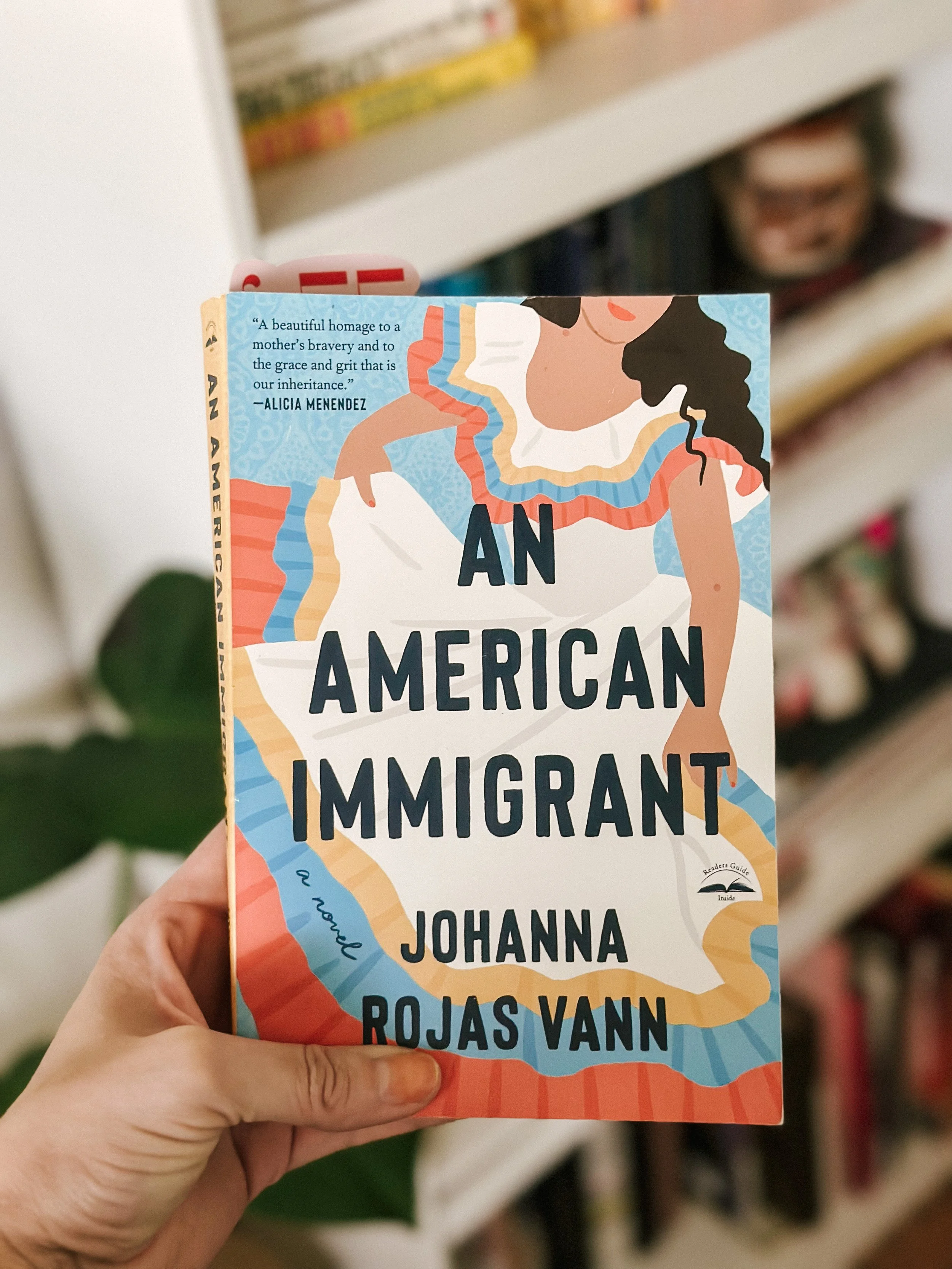The Storytelling Journey of Johanna Rojas Vann
Stumbling upon Johanna Rojas Vann’s debut novel, An American Immigrant was one of this past summer’s most pleasant surprises and I’ve been excited to share it with you since! In it, Johanna draws inspiration from her mother’s border crossing story. She infuses her storytelling with fe, familia, culture, and community in the most beautiful way! As a fellow daughter of immigrants, I related to many of the tensions and joys of the first generation depicted in this story. When I heard Johanna is a fellow Latina who loves Jesus, I knew we had to invite her into our LLJ casita! Here’s my interview with Johanna:
Bienvenida, tell us a bit about yourself!
Hola! My name is Johanna Vann, and I am a wife, mother to two toddlers, and professional writer in Nashville, TN. I was born in Queens, New York, but when I was nine, my parents followed close friends to Maryland in search of a more affordable life. After nine years in Maryland, I left home to attend Penn State, where I studied broadcast journalism. I’d always wanted to be a news reporter, but after two years in the business after college, I knew I had to find another way to put my skills to good use. Eventually, I stumbled upon copywriting, which I really enjoyed! When I started having children, I left corporate America and decided it was time to make yet another career pivot. I still wanted to write, but I wanted to try something different: fiction. After two years of writing (and tons of editing), my debut novel, An American Immigrant, was born! Outside of writing, I’m mostly a stay-at-home mom who loves books, Jesus, and specialty coffee.
How has faith influenced your family’s story?
Faith has shaped every inch and corner of my family’s story. When my mother was a young girl, missionaries came to her home in Cali, Colombia, and through them, she got involved in a local church and fell in love with a faith that would sustain her through many years of hardship and suffering. My siblings and I were very fortunate to witness our parents put their faith into action as two hard-working immigrants in New York City. They infused every part of our family’s life with faith—music, family devotions, church involvement, etc. We grew up in the church, and now we’re raising our kids the same way. It’s hard to say what our lives would look like today without our faith, but I think my mom’s story would have taken a completely different trajectory from the one you read about in my novel, An American Immigrant, had she not known the truth.
What made you decide to share your mother’s story in novel form?
Stories are such a fun way to share truth in beautiful, subtle ways. I’ve always loved novels. To me, they’re not just a fun story to escape into. The books I read often teach me so much about life, family, and faith, and I knew I wanted to do the same for others. I didn’t want to share a lesson or give a sermon on first and second-generation immigrants in the U.S. today. I wanted to share an inspiring and entertaining story that would take readers on a journey of self-discovery, in their own timing and in their own way, without me dictating what that looks like. I also knew I didn’t just want to share my mother’s story (although that would have been enough to fill an entire book on its own). I’ve always wanted to share the experience of the second-generation immigrant as well—the children who grow up in the U.S. with parents who were not born in the U.S. I knew a novel would be the perfect way to marry both journeys and allow for others to find themselves in the story too.
You also mentioned not being aware of your mother’s immigration story until you were in college. What prompted that? How did her story surface for you, and what was that experience like?
Looking back, I’m baffled that I wasn’t more interested in my parent’s stories as a young girl. But at the same time, children can be pretty selfish, so I’m also not surprised! It wasn’t until I was a freshman in college that I first heard a story from my mom that prompted many questions. I honestly don’t remember how it came up. Still, she told me the story about the inhumane treatment she received at the airport in Mexico City when she was trying to cross the border into America (you can read about this story in my book). I think my jaw hit the concrete floor that afternoon, and I had so many questions for her once I’d heard this. As she told me more stories (because I asked for them), she would joke about me writing them into a book—little did she know it would happen! This became such a fun season where I would sit down with my mother for long stretches of time and just ask her for more and more stories. I would write things down or record her telling me the story—I was capturing the stories before I even knew what I would do with them, and I’m so glad I did!
How did the process of writing An American Immigrant change or challenge you?
Wow, writing this book challenged me in so many ways. As a daughter, it changed the way I see my mother. You see, Melanie, my protagonist, experienced something similar in my book… once she’d read many of her mother’s journal entries, Melanie realized the woman she thought she knew as a mother was someone completely different. Rather than a meek and quiet woman, Melanie realizes her mom is actually strong, independent, and fearless, and these are all realizations I had in real life about my mom! This book also challenged me as a mom. You see, I wrote this book with a newborn in my home, and then I sold the manuscript to my publisher the day before I gave birth to my second child, which meant I was working on edits to a 90,000-word manuscript with a two-month-old sleeping on my chest. It truly made me realize how much our capacities can increase when we’re chasing something we really want. While the experience was hard and exhausting, I know now that I’m capable of more than I think, especially with the strength of Christ on my side.
You include Latin American, particularly Colombian, social and political history in your storytelling. Why was that an essential element you wanted to include in the story?
I included social and political history in my story because it played an important role in my mother’s story. My mother crossed the border in the 80’s—at the height of the era of Pablo Escobar. At that point in time, it was incredibly hard to be a Colombian. The world associated all Colombians with drugs, cartels, and violence (which is why my mother was treated the way she was treated at the airport in Mexico City). It was an important context that I wanted to share with readers both to educate and to add a fun historical element—it was yet another subtle way to offer readers a rich reading experience.
Lastly, because this is LLJ, what does being a Latina who loves Jesus mean to you? In what ways has it influenced your approach to storytelling?
I love this question. I’m immediately picturing the many churches I’ve attended throughout my life and how every culture/city worships differently. That’s what I think about when I think about being a Latina who loves Jesus. My cultural identity—given to me by the God who created me—brings uniqueness and richness to my faith. That doesn’t make it better than someone else’s faith, just different. I think about the energy I feel during a worship service to want to shout and dance and raise my hands—it mirrors the way we dance and celebrate when my Colombian family gathers for a party. So I bring that energy and passion to my worship of Jesus, and I know he is pleased to watch all of his children worship however He created them to worship. Isn’t that cool? There’s one important way being a Latina who loves Jesus has influenced my approach to storytelling: I write about Latinas who love Jesus. My debut was chock full of Latinas, and while my next book might not be all Latinas, I have a feeling the protagonist will always be a Latina who loves (or is learning to love) Jesus. And what a privilege it is to write about that.
Click here to buy Johanna’s book
Follow Johanna on Instagram
Visit Johanna’s blog


